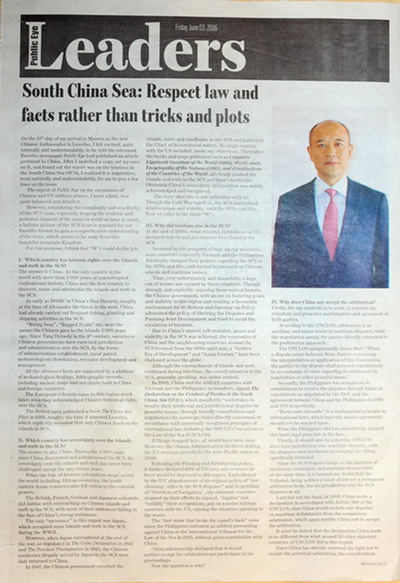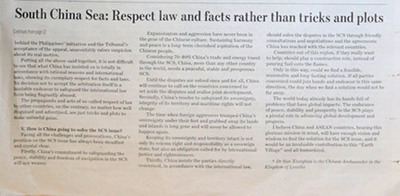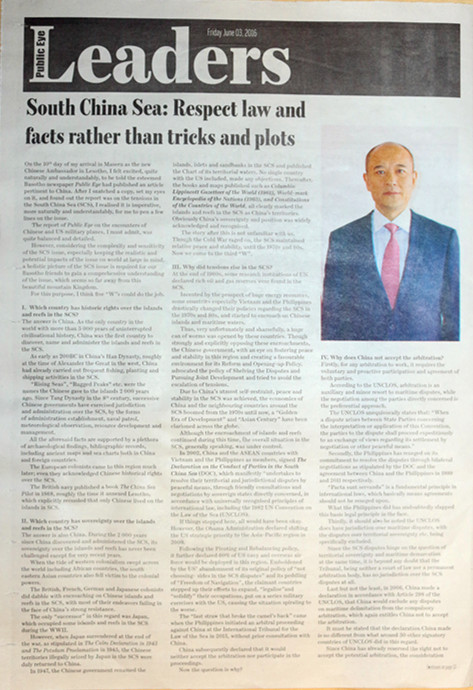On 3 June, 2016, the Public Eye of Lesotho published an article by Ambassador Sun Xianghua: South China Sea: Respect Law and Facts rather than Tricks and Plots. The full text is as follows:

South China Sea: Respect Law and Facts rather than Tricks and Plots
On the 10th day of my arrival in Maseru as the new Chinese Ambassador in Lesotho, I felt excited, quite naturally and understandably, to be told the esteemed Basotho newspaper the Public Eye had published an article pertinent to China. After I snatched a copy, set my eyes on it, and found out the report was on the tensions in the South China Sea(SCS), I realized it's imperative, more naturally and understandably, for me to pen a few lines on the issue. The report of the Public Eye on the encounters of Chinese and US military planes, I must admit, was quite balanced and detailed. However, considering the complexity and sensitivity of the SCS issue, especially keeping the realistic and potential impacts of the issue on world at large in mind, a holistic picture of the SCS issue is required for our Basotho friends to gain a comprehensive understanding of the issue which seems so far away from this beautiful mountain Kingdom. For this purpose, I think five "W"s could do the job.
I. Which country has historic rights over the islands and reefs in the SCS?
The answer is China. As the only country in the world with more than 5000 years of uninterrupted civilizational history, China was the first country to discover, name and administrate the islands and reefs in the SCS. As early as 200BC in China's Han Dynasty, roughly at the time of Alexander the Great in the west, China has already carried out frequent fishing, planting and shipping activities in the SCS. "Rising Seas", "Rugged Peaks " etc. were the names the Chinese gave to the islands 2000 years ago. Since Tang dynasty in the 8th century, successive Chinese governments have exercised jurisdiction and administration over the SCS, by the forms of administration establishment, naval patrol, meteorological observation, resource development and management. All the above-said facts are supported by a plethora of archaeological findings, bibliographic records, including ancient maps and sea charts both in China and foreign countries. The European colonists came to this region much later, even they acknowledged Chinese historical rights over the SCS. The British navy published a book The China Sea Pilot in 1868, roughly the time it annexed Lesotho, which explicitly recorded that only Chinese lived on the islands in SCS.
II. Which country has sovereignty over the islands and reefs in the SCS?
The answer is also China. During the 2000 years since China discovered and administrated the SCS, its sovereignty over the islands and reefs has never been challenged except for very recent years. When the tide of western colonialism swept across the world including African countries, the south eastern Asian countries also fell victims to the colonial powers. The British, French, German and Japanese colonists did dabble with encroaching on Chinese islands and reefs in the SCS, with most of their endeavors failed in face of China's strong resistance. The only "successor" in this regard was Japan which occupied some islands and reefs in the SCS during the WWII. However, when Japan surrendered at the end of war, as stipulated in The Cairo Declaration in 1943 and The Potsdam Proclamation in 1945, the Chinese territories illegally seized by Japan in the SCS were dully returned to China. In 1947, the Chinese government renamed the islands, islets and sandbanks in the SCS and published the Chart of its territorial waters. No single country with the US included, made any objections. Thereafter, the books and maps published such as Columbia Lippincott Gazetteer of the World(1961), Worldmark Encyclopedia of the Nations(1963), and Constitutions of the Countries of the World, all clearly marked the islands and reefs in the SCS as China's territories. Obviously China's sovereignty and position was widely acknowledged and recognized. The story after this is not unfamiliar with us. Though the Cold War raged on, the SCS maintained relative peace and stability, until the 1970s and 80s. Now we come to the third "W".
III. Why did tensions rise in the SCS?
At the end of 1960s, some research institutions of UN declared rich oil and gas reserves were found in the SCS. Incented by the prospect of huge energy resources, some countries especially Vietnam and the Philippines drastically changed their policies regarding the SCS in the 1970s and 80s, and started to encroach on Chinese islands and maritime waters. Thus, very unfortunately and shamefully, a huge can of worms was opened by these countries. Though strongly and explicitly opposing these encroachments, the Chinese government, with an eye on fostering peace and stability in this region and creating a favorable environment for its Reform and Opening-up Policy, advocated the policy of Shelving the Disputes and Pursuing Joint Development and tried to avoid the escalation of tensions. Due to China's utmost self-restraint, peace and stability in the SCS was achieved, the economies of China and the neighboring countries around the SCS boomed from the 1970s until now, a "Golden Era of Development" and "Asian Century" have been clarioned across the globe. Although the encroachment of islands and reefs continued during this time, the overall situation in the SCS, generally speaking, was under control. In 2002, China and the ASEAN countries with Vietnam and the Philippines as members, signed The Declaration on the Conduct of Parties in the South China Sea(DOC), which manifestly "undertakes to resolve their territorial and jurisdictional disputes by peaceful means, through friendly consultations and negotiations by sovereign states directly concerned, in accordance with universally recognized principles of international law, including the 1982 UN Convention on the Law of the Sea(UNCLOS)". If things stopped here, all would have been all right. However, the Obama Administration declared shifting the US strategic priority to the Asia-Pacific region in 2009. Following the Pivoting and Rebalancing policy, it further declared 60% of US navy and overseas airforce would be deployed in this region. Emboldened by the US' abandonment of its original policy of "not choosing- sides in the SCS disputes" and its peddling of "Freedom of Navigation", the claimant countries stepped up their efforts to expand, "legalize"and "solidify" their occupations, put on a series military exercises with the US, causing the situation spiraling to the worse. The "last straw that crashes a camel" came when the Philippines initiated an arbitral proceeding against China at the International Tribunal for the Law of the Sea in 2013, without prior consultation with China . China subsequently declared that it would neither accept the arbitration nor participate in the proceedings. Now the question is why.
IV. Why does not China accept the arbitration?
Firstly, for any arbitration to work, it requires the voluntary and proactive participation and agreement of both parties. According to the UNCLOS, arbitration is an auxiliary and minor resort to maritime disputes, while the negotiation among the parties directly concerned is the preferential approach. The UNCLOS unequivocally states "When a dispute arises between State Parties concerning the interpretation or application of this Convention, the parties to the dispute shall proceed expeditiously to an exchange of views regarding its settlement by negotiation or other peaceful means." Secondly, the Philippines has reneged on its commitment to resolve the disputes through bilateral negotiations as stipulated by the DOC and the agreement between China and the Philippines in 1999 and 2011 respectively. "Pacta sunt servanda" is a fundamental principle in international laws, which basically means agreements should not be reneged upon. What the Philippines did has undoubtedly slapped this basic legal principle in the face. Thirdly, it should also be noted the UNCLOS does have jurisdiction over maritime disputes,with the disputes over territorial sovereignty etc. being specifically excluded. Since the SCS disputes hinges on the question on territorial sovereignty and maritime demarcation at the same time, it's beyond any dout that the Tribunal, being neither a court of law nor a permanent arbitration body, has no jurisdiction over the SCS disputes at all. Last but not the least, in 2006, China made a declaration, in accordance with Article 298 of the UNCLOS, that China would exclude any disputes on maritime delimitation from the compulsory arbitration, which again entitles China not to accept the arbitration. It must be pointed that the declaration China made is no different from what around 30 other signatory countries of UNCLOS did in this regard. Since China has already reserved the right not to accept the potential arbitration, the consideration behind the Philippines' initiation and the Tribunal's acceptance of the appeal, unavoidably raises suspicion about its real motive. Putting all the above-said together, it's not difficult to see that what China has insisted is totally in accordance with rational reasons and international laws, showing its examplary respect for facts and laws. Its decision not to accept the arbitration itself, is a laudable endeavor to safeguard the international law from being flagrantly abused. The propaganda and acts of so-called respect of law by some other countries, on the contrary, no matter how well disguised and advertised, are just tricks and plots to make unlawful gains.
V. How is China going to solve the SCS issue?
Facing all the challenges and provocations, China's position on the SCS issue has always been steadfast and crystal clear. Firstly, China's commitment to safeguarding the peace, stability and freedom of navigation in the SCS will not weaver. Expansionism and aggression has never been in the gene of the Chinese culture. Sustaining Harmony and peace is an long cherished aspiration of the Chinese people. Considering 70-80% China's trade and energy travel through the SCS, China, more than any other country in the world, needs a peaceful, stable and prosperous SCS. Until the disputes are solved once and for all, China will continue to call on the countries concerned to set aside the disputes and realize joint development. Secondly, China's resolve to safeguard its sovereignty, integrity of its territory and maritime rights will not change. The time when foreign aggressors tramped China's sovereignty under feet and grabbed away its lands and islands is long gone and will never be allowed to happen again. Keeping its sovereignty and territory intact is not only its solemn right and responsibility as a sovereign state, but also an obligation called for by international justice and righteousness. Thirdly, China insists the disputes in the SCS should be solved through friendly consultations and negotiations by the parties directly concerned, in accordance with the international law and the agreements China has reached with the relevant countries. Countries out of this region, if they really want to help, should play a constructive role, instead of pouring fuel into the flames. Only in this way, could we find a feasible, reasonable and long-lasting solution. If all parties concerned all join hands and endeavor in this same direction, the day when we find a solution would not be far away.
The world today has already got its hands full of problems that have global impacts. The continuity of peace, stability and prosperity in the SCS plays a pivotal role in advancing global development and progress. I believe China and ASEAN countries , bearing this glorious mission in mind, will have enough vision and wisdom to find the solution for the SCS issue, and it would be an invaluable contribution to this "Earth Village" and all humankind.


